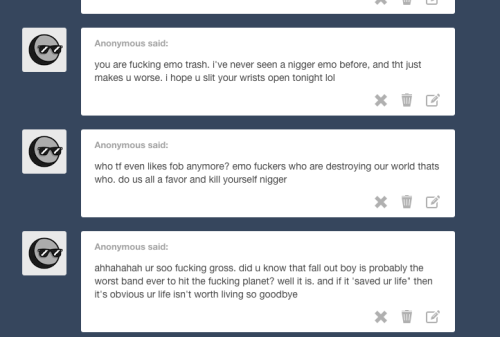CW: Vulgar language and verbal threats
For all the venues of communication that anonymity affords,
there are considerable perils as well. Anyone who has been online long enough
knows what I’m talking about. Anonymous hate. It can be fun to leave, but it’s
never fun to receive.
The anonymous function at its core separates people from
their words, which can be incredibly freeing for most. This fact alone makes
many people rally behind the cause of protecting anonymous posting
capabilities. They ultimately consider it worth protecting despite all of the
consequences that come with it, both the positives and the negatives. And at
times, those are almost inseparable. After all, and perhaps most importantly, anon
divests the poster from the consequences of their actions. The words appear,
but without an apparent author to claim ownership. There’s no easy way to track
down the original poster or even identify them. In a large group of anon posts,
the confusion easily increases. One person can play the role of multiple anons.
They can create a whole thread of different personas having a “conversation” in
order to prove a point or purposely create drama.
Of course, sometimes anon hate is isolated and so vague that
it’s almost ridiculous. Such messages are easy to dismiss and delete, or even ridicule.
But sometimes anon hate can be unfunny and even destructive.
The behavior extends into and escalates in private messages, which often serve
as the venue for pointed attacks. Vicious attacks may be mounted against one
user through anonymous messaging. Sometimes the attackers really are a number
of different users who, for some reason, feel the need to heckle a particular
individual. Much more commonly, however, the anon hate all stems from one user
sending multiple messages that claim to originate from different people. This tactic
purposely ramps up the magnitude of the attack in a way that non-anonymous
messaging simply cannot hope to replicate. It breeds paranoia and suspicion and
creates a very hostile and unsafe environment for the victim. They have no way
of knowing who or how many people are singling them out. And they can’t just
block them and move on since it’s all anonymous.
Again, they have no idea who is really attacking them.
It could be anyone. A follower? A fan? A random visitor? A
close friend? The last possibility in particular erodes confidence and trust at
an individual level, and consequently detracts from community interaction as a
whole. Fandom is no exception. Once stung, it is incredibly common and
completely understandable that a user would not want to continue participating
in that fandom. At worse, the fan might delete their account or leave the
community completely.
With sites that enable users to turn anonymous commenting or messages on or off, however, the recipient of anonymous hate frequently just disables those possibilities. It’s a simple enough response, but the restriction leaves some subtle consequences. It closes the user off from more general interaction with fans and shuts down a whole venue of communication. People can no longer, for example, send anonymous confessions or personal messages to that user without outing themselves. As such, they are more likely to just avoid any attempts at communication with that user in general.
With sites that enable users to turn anonymous commenting or messages on or off, however, the recipient of anonymous hate frequently just disables those possibilities. It’s a simple enough response, but the restriction leaves some subtle consequences. It closes the user off from more general interaction with fans and shuts down a whole venue of communication. People can no longer, for example, send anonymous confessions or personal messages to that user without outing themselves. As such, they are more likely to just avoid any attempts at communication with that user in general.
Anon can be a great tool. But like any tool, it can be misused.
And the consequences can affect everyone.


No comments:
Post a Comment